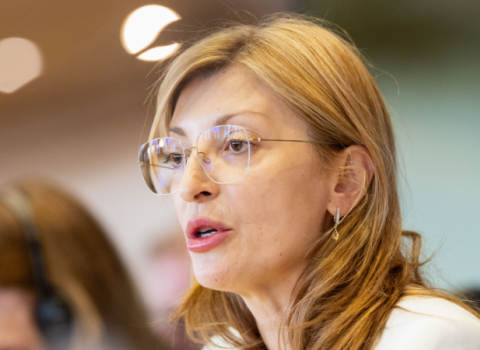The ERA Forum is rushing to elaborate and revise countless technical documents in preparation for the 2025-27 cycle. A strategic approach to guaranteeing the fifth freedom - of free movement of researchers, scientific knowledge and technology - is at risk of getting lost in this avalanche of detail

Mattias Björnmalm, secretary general of CESAER, an association of universities of science and technology in Europe
“Way too many!” This was the reaction of many in the European Research Area (ERA) Forum when over 40 new actions were pitched for the 2025 - 2027 policy agenda – adding to the 20 actions previously agreed for the 2022 - 2024 agenda.
Alongside the slew of actions, the subgroups dealing with the current actions are being pushed to elaborate how they see their work translating over to 2025 – 2027. In this avalanche of technical detail, the underlying strategy is in danger of getting buried. It is time to stand back from technical minutiae, take in the bigger picture and reboot.
EU commissioners from Spinelli to Dahrendorf, Ruperti, Busquin, Potočnik and Geoghegan-Quinn, all contributed to establishing a strong, coherent and consistent ERA narrative. Milestones along the way include the creation of the Single Area for European Science (1973), the inclusion of research as a formal community policy objective (1986) and enshrining ERA in the Treaty on the Functioning of the EU (2007).
As a result of the latter, the free circulation of researchers, scientific knowledge and technology became the fifth freedom in the EU, alongside the European single market - of free circulation of goods, capital, services, and people. The five freedoms are legal obligations agreed by all member states, meaning they are mandatory and that the EU institutions should play a key role in ensuring their enforcement. This includes EU legislation enforced by EU courts.
But while the EU institutions have taken on a clear role on building and safeguarding the four freedoms, the fifth freedom has been relegated to a largely voluntary, if-you-feel-like-it approach. This must change.
Sustainable funding, favourable framework
To deliver on the vision, ERA must be underpinned by sustainable funding and favourable framework conditions. To ensure conditions under which ERA can prosper, it is necessary to identify and dismantle legal barriers to the free circulation of researchers, scientific knowledge and technology.
Conceptually this may seem straightforward, but in reality implementation can be tricky. It may include new enabling legislation at EU level, and correcting (unintentional) legal barriers across the EU and nationally. Here, the ERA Forum could play a unique role connecting the EU and national levels with key stakeholder organisations, to identify and elaborate where and what action is needed, and feeding into decision making in the European Commission and the Council of the EU.
For many of those who have read the dozens of proposals currently being discussed in the context of the policy agenda 2025-2027, it is difficult to see any conceptual difference from standard actions under Horizon Europe, such as research and innovation actions (RIA), or coordination and support actions (CSA).
While many of the proposals are undoubtedly important in themselves, a much better fit would be to implement them as RIA or CSA calls under Horizon Europe, and not as actions for the ERA Forum. If left to ERA Forum, these proposals risk being a distraction from the urgent action needed to realise the fifth freedom.
A two-pronged rethink and restart is needed. First, to get from under the avalanche of technical discussions and documentation, we should reboot the strategy. The starting point should be the understanding that ERA is a treaty obligation. The realisation and continued safeguarding of the four freedoms did not come about through a voluntary approach and it is a mistake to believe the fifth freedom can be realised in that way.
A mandatory approach rooted in the treaty obligation is therefore the right way forward.
Second, instead of the ERA Forum taking on an a-little-bit-of-everything approach, let us refocus on its unique position as a channel connecting the EU and national levels with key stakeholder organisations to identify the most critical barriers to the free circulation of researchers, scientific knowledge and technology, and propose ways to legally dismantle them.
There is much (legislative) work needed:
- to advance open science, the EU should enshrine a secondary publishing right for scientific knowledge at the EU level through EU legislation;
- to attract, train, retain and circulate research talent, the EU should correct incompatible labour laws, migration rules, social security schemes and pension systems hindering and restricting the circulation of researchers across the EU;
- to safeguard institutional autonomy in research and innovation, the EU must prevent ‘autonomy traps’ being introduced by national legislation, for example in knowledge safety and security areas;
- to prevent ‘waterbed effects’ in the recruitment of research staff and students, particularly in key technology areas, the EU must prevent a fragmented landscape of national legislative approaches;
- to protect the freedom of scientific research, the EU should establish a European regulation enforced by EU courts.
These are just a handful of examples where legislative action is urgently needed to advance and safeguard the fifth freedom.
Adjusting course towards the fifth freedom
The leadership of the ERA Forum has made heroic efforts to try to contain and guide the ever-expanding list of actions and priorities. To adopt a strategic approach, backing is also needed at a political level, as it concerns the level of ambition of what the ERA is, and the mandate for what the ERA Forum can do.
We are currently on a trajectory where ERA and its Forum is moving towards a-little-bit-of-everything done according to an if-you-feel-like-it approach. Now is the time to adjust course and realign, so that ERA is directed to realising the fifth freedom through a strategic and mandatory approach that is rooted in the treaty obligation.
To contribute to the restart of the strategic approach of the ERA, CESAER has published two control questions. They may be used by the ERA Forum to amp up the ambition and focus on the high-level status of ERA as the fifth freedom.
At stake is the policy agenda for 2025-2027, where the design is ongoing. Given this, action is urgently required if we do not want to lose four years. We cannot afford to wait until 2028 to reinvigorate our efforts in realising the fifth freedom.
Mattias Björnmalm is secretary general of CESAER





 A unique international forum for public research organisations and companies to connect their external engagement with strategic interests around their R&D system.
A unique international forum for public research organisations and companies to connect their external engagement with strategic interests around their R&D system.